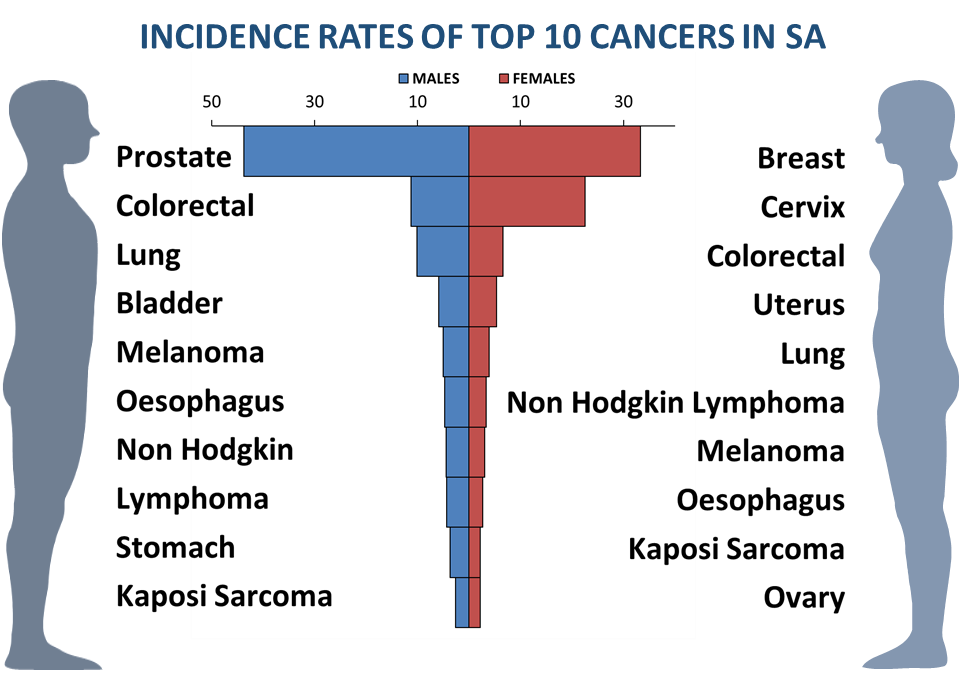Tuesday (4 February) is World Cancer Day. In an opinion piece for News24, Prof Vikash Sewram from the African Cancer Institute reflects on what still needs to be done to combat the disease.
- Read the article below or click here for the piece as published.
Cancer remains a formidable adversary that afflicts all communities without discrimination or boundaries. Its burden impinges on the lives of tens of millions annually, making it a major and increasing public health problem worldwide. The word 'cancer' invokes deep fear as a silent killer, with many viewing this disease as a symbol of grief and pain, a plague straining our intellectual and emotional resources. But our resilience and need to survive is a reflection of human tenacity and unwavering spirit to conquer the odds, and it is this tenacity to continue the fight against cancer that has led to remarkable strides in better understanding the aetiology of the disease, the complexities regarding its biology, methods for prevention, screening, diagnosis and advances in cancer treatment.
World Cancer Day, spearheaded by the Union for International Cancer Control (UICC), takes place every year on 4 February and is the uniting global initiative under which the world comes together to raise the profile of cancer in a positive and inspiring way. Cancer has a significant health impact on the global population, and as we commemorate World Cancer Day, we ought to reflect, acknowledge and recognise that the continued battle against cancer is not a singular effort and a unified response is mandatory to ensure a path to victory. Everyone can play a role in ensuring global success. 2020 is the second year of the new three-year campaign by the UICC, 'I Am and I Will'. The new theme is an empowering call for personal commitment and represents the power of our actions taken now to reduce the growing impact of cancer. We must also remind ourselves of the broad societal impacts beyond the negative effects it has on individual health outcomes, including productivity losses for cancer patients and their family caregivers. We must not sway in our resilience to ensure efforts for increased early stage cancer detection, screening, and diagnostic services coupled by timeous and appropriately treatment to significantly improve cancer patients' chances of survival and quality of life.
The global cancer burden is estimated to have risen to 18.1 million new cases and 9.6 million deaths in 2018. One in five men and one in six women worldwide develop cancer during their lifetime, and one in eight men and one in 11 women die from the disease. Unless greater efforts are placed into altering the course of the disease, this number is expected to rise to close to 30 million new cases by 2040. With South Africa's growing population of approximately 59 million and an aging population, the caseload is expected to double by 2040 as well. Cancer remains the 6th main cause of mortality in South Africa and latest data from the National Cancer Registry reveals that in 2014, close to 75000 new cases were diagnosed. Cancers of the breast, cervix and prostate continue to dominate with a similar profile extending into Africa.
It is important to note that about 30% of cancer deaths are due to the five leading behavioural and dietary risks, i.e. high body mass index, low fruit and vegetable intake, lack of physical activity, tobacco use and alcohol use. Many cancers can be prevented by avoiding exposure to these common risk factors. In addition, a s appropriately in order to improve the quality of life and life expectancy of South Africans. There is no 'one' solution to the country's cancer problem. Decades of research and medical ingenuity have improved and extended the lives of many cancer patients, but despite these advances, a combined effort between the public and private sectors, academia, advocacy groups and patients are required to beat this complex disease.
Barriers exist at the individual, health system, and government level, which prevent millions of people globally from receiving an early diagnosis and better treatment. There are huge disparities in health resources (infrastructure, human resources, access to treatment, etc.) that make populations in Africa, including South Africa extremely vulnerable to developing and treating cancer.
Encouragement and support of spouses and family members are key to minimising individual-level barriers related to early detection, screening, and diagnosis. Feelings of shame and fear, combined with poor health awareness and cultural beliefs, can also keep an individual from utilising medical care or screening programmes. Prevention efforts linked to early detection and diagnosis are likely to offer improved prognosis and better outcomes. Prevention also offers the most cost‐effective long‐term strategy for the control of cancer. This goal is being viewed as more realistic, socially responsive and financially sound when compared to the aggressive therapeutic options of chemotherapy, surgery and radiation.
Health system-related barriers such as increased awareness among health care workers to detect cancer early, especially at the primary care level, and lack of an efficient and timely referral for testing and diagnosis leads to needless delays in treatment. Therefore, continued efforts in strengthening the capacity of the health sector, improving access to treatments and supportive services remain core to curbing the rising epidemic of cancer.
In our efforts to minimise the cancer burden, the African Cancer Institute at the Faculty of Medicine and Health Sciences at Stellenbosch University has become a key player in the global fight against cancer through its commitment to research excellence, committed and inspired faculty and robust partnerships with world-renowned research and training institutions as well as advocacy and support groups. These partnerships have ensured that the best minds work cohesively in bringing hope to cancer patients and their families worldwide.
*Prof Vikash Sewram is the Director of the African Cancer Institute in the Faculty of Medicine and Health Sciences at Stellenbosch University.

